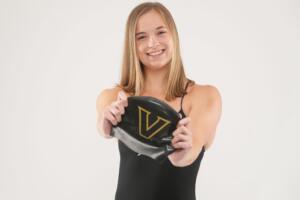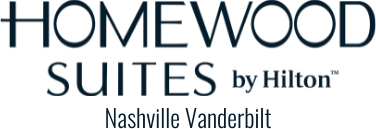Learning by the Lap
by Graham HaysBy coming to Vanderbilt to study communities, record-setting swimmer Abby Francis made one stronger
NASHVILLE, Tenn. — It didn’t take Abby Francis long to find her places in Nashville. If she’s not studying in one of her favorite coffee shops or using her Commodore Card to try new fare at local restaurants, she’s likely tucked away in a quiet corner on the second floor of 6 Magnolia Circle, where the Peabody graduate student’s classes meet.
Surroundings that were unfamiliar eight months ago, when the graduate transfer arrived from Davidson, now are comfortably recognizable. Teammates whom the former Atlantic 10 champion didn’t know now are family. A campus of strangers when she began the master’s program in Human Development Studies now is a community—one that is better for her presence.

Francis came to Vanderbilt to learn more about how communities can influence the classrooms of future generations. To teammates and coaches on the swim team, she’s also proof that one person doesn’t need a long time to influence her community.
“Coming in for one year, you never know how someone is going to gel with the team because they are just here for a brief second, in the scheme of things,” swimming head coach Jeremy Organ said. “But we just feel like we’re lucky to have this person be a part of our program for even a year. She’s just a very kindhearted, sweet kid, someone who is very thankful for every opportunity she has.
“Her teammates call her the GOAT, affectionately, because she seems to have it going in all areas.”
Finding Community in Education
Francis taught long before she knew she wanted to study education. As a high schooler in Wethersfield, Connecticut, she taught local children how to swim—she had been swimming so long that her mother only half jokes that she took her first steps in a wading pool.
An education class during her first year at Davidson further solidified her interest and led to her to summer work in nearby Charlotte with Freedom School Partners, an organization that provides summer learning programs for low-income children. The organization is typically actively engaged with the community, bringing in business and civic leaders as part of the programming. But during the COVID-19 pandemic, they had to adapt their practices. Being part of that experience fed Francis’ interest in community involvement in education.
At Davidson, she found a mentor in Chris Marsicano, assistant professor of education studies. He was also her initial connection to Vanderbilt, where he had earned his Ph.D. She began assisting with research for joint studies by Marsicano and Vanderbilt’s John M. Braxton, professor emeritus in the Department of Leadership, Policy and Organizations. While still a Davidson undergraduate, she worked with them on an academic paper on the fate of public intellectuals in community discussions that was published in the journal New Directions for Higher Education. Now, while working toward her master’s at Vanderbilt, she assists Braxton with research projects. Among the topics, as education grows increasingly politicized, is how research can be shared with mass audiences in a digestible manner.
“He’s giving me the opportunity to make decisions and really wants my input,” Francis said. “And asking questions, having more of this dialogue back and forth, has been really helpful in how I view myself as a researcher and academic. I really appreciate his guidance in that.”
She is in the process of applying to doctoral programs. It’s too soon to know where that will lead, whether into teaching and administration in higher education or perhaps public policy or think-tank work. Whatever path she chooses, she wants to continue her research.
“What excites me is understanding the influence that community does play in education,” Francis said. “I feel like that is so often isolated from what’s going on in the classroom. Bridging that gap, whether it’s through connecting research and practice or just understanding the influence that community plays in the classroom—the role of parent organizations and things like that—really interests me. That’s especially true in this age during and after COVID.”

Finding Community in the Pool
The COVID age is also why she is still in the pool. By the end of her first year at Davidson, she knew that she would have the option of an additional year of NCAA eligibility—granted to all student-athletes whose undergraduate years were affected by the pandemic. But Davidson doesn’t offer graduate degrees, which meant that she would need to use that eligibility somewhere else.
She wasn’t always sure she wanted the extra year. Francis is an accomplished swimmer. She’s a three-time conference champion after winning the 50 free and two relays at the 2021 Atlantic 10 Championships. In all, she medaled 10 times in three conference championships. But she’s always enjoyed the relays more than anything else—swimming fast for her teammates offers greater motivation than winning solo races or setting personal records. Collegiate swimming is much more of a team sport than at other levels, and it’s the communal nature of a team that kept her going. The idea of swimming without the classmates who became her best friends over four years gave her pause. At the same time, stepping out of the pool for the final time is difficult to contemplate. After battling injuries as a senior, she decided to swim on.
“This was my redemption year,” Francis said. “I had a few things left in the sport that I wanted to do. And I also wanted to see what it was like in a new community, see what new practices would be like, new types of training philosophies. There was a time when I considered stopping, but then I had this opportunity—and I knew I needed to take it.”
Organ happily welcomed her. In short order, she recorded the second-best time in school history in the 50 breaststroke, as well as top 10 times in the 100 breast, 50 and 100 free and 200 individual medley. She won the 100 free against Illinois and Iowa and placed second in the same race against Arkansas. Delighting her most of all, she helped set a school record in the 400 free relay. Her form may not be textbook, but when the race begins, she’s tough to beat.
“She’s got a lot of natural speed and a really good feel for the water,” Organ said. “She’s able to swim all four strokes, so she’s somebody that we can plug in to different places where we need her. And we know she’s going to give us everything that she’s got and be competitive with it. She’s had a really big impact with relays, being able to step up and be a big part of those.”
View this post on Instagram
For all of that, it’s not her times or results that represent her greatest contribution. Vanderbilt doesn’t designate specific team captains, instead asking everyone to find ways to contribute to the culture to the best of their abilities. Though she was a captain at Davidson, Francis isn’t the loudest voice or the most likely to make an impassioned speech. But it turns out that someone who spends a great deal of her time out of the pool studying the best ways to convey complicated messages and inspire community action doesn’t necessarily need a bullhorn to share her experience and outlook.
“What she really brings as a leader is how she approaches every day and just how genuine she is,” Organ said. “I think that bleeds into everybody else who is around her, seeing how happy she is to be here and how appreciative she is of all the opportunities that she gets.”
A year passes in the blink of an eye. As she prepares for her final home meet against Tulane on Friday, she’s made the Vanderbilt community her home and the swim team her family. She’s better for the experience. So are her teammates and coaches. So is Vanderbilt.
“I’ve only been here for so long, so I’m still learning some of the traditions, customs and norms,” Francis said. “But I also want to connect with these people and be the best teammate I can be in the time I have. Not that I’m that much older, but I’ve learned to embrace teaching by how I act. And in return, they’ve taught me so much, and I appreciate their friendship.”
Most of us could learn something from her. Which for an aspiring educator, isn’t a bad legacy.

